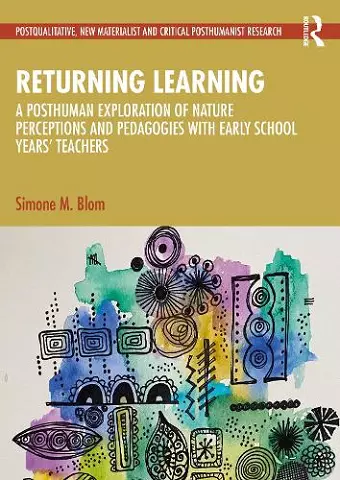Returning Learning
A Diffractive, Posthuman Exploration of Nature Perceptions and Pedagogies with Early School Years’ Teachers
Format:Paperback
Publisher:Taylor & Francis Ltd
Publishing:30th Dec '24
£36.99
This title is due to be published on 30th December, and will be despatched as soon as possible.

Returning Learning explores early school years teachers’ perceptions of nature and how this informs their pedagogy through a posthuman theoretical framework. The theoretical framework is purposefully designed to disrupt dichotomies and reject abuse to marginalised others. In doing so, this book offers a reconceptualisation of learning in environmental education, and education more broadly.
The posthuman theoretical framework is a transdisciplinary offering informed by material-discursive practices, affective atmospheres, and childhoodnature. The theoretical framework and transqualitative methodology support diffractive ethnographic methods where data are generated through an iterative and entangled data collection and data analysis process. This process is presented as a series of "diffractive data entanglements" that explore teachers’ perceptions of nature, their pedagogical practices, and the implications of these data through a posthuman framing. These non-conventional approaches to undertaking research are the foundation for this book that listens to teacher’s voices by conducting research with teachers rather than to teachers.
Through a deep exploration into the intricacies of everyday classroom practices and happenings, this book privileges the voices of the teachers and the nonhuman, thus the response-ability of teachers to their students and the planet, is re-turned. It will be of interest to researchers who are interested in creative and innovative theories and methodologies as well as those studying environmental education and other pedagogical studies as part of their courses.
This book is a gift for all early years teachers; it is a gift they have been waiting for, as they ponder how to make a positive contribution to the troubled world the children are growing up in. Blom offers a way of thinking-in-being, where teachers, and the children they teach, are not outside nature, or opposite to nature. The children are not growing up in that world, but as that world; indeed we are, as humans, not superior to nature, or separate from it, or above it; we are, all of us, nature.
--Professor Bronwyn Davies, Professorial Fellow, University of Melbourne and Emeritus Professor, Western Sydney University
Blom begins this book positing that “there is a desperate and urgent need for monumental changes to education systems” and I think that is correct. So where better to start than from the beginning, accompanying young children and their human and more-than-human educators as they re-turn themselves into earthy relationality. A must read for those teaching, thinking, and seeking in the direction of monumental change.
--Professor Sean Blenkinsop, Faculty of Education, Simon Fraser University and Co-Director, Imaginative Education Research Group (IERG)
In this fascinating and challenging book, Blom takes cues from posthumanism, postqualitative inquiry, and non-representational theory in advancing a novel approach to educational research called transqualitative inquiry. But it doesn’t stop there! Blom then takes us on a ‘diffractive journey’ through a series of data entanglements that demonstrate how transqualitative inquiry can be put to work. The result is a ‘deep dive’ into the intricacies of everyday classroom practices and happenings which privileges the voices of the teachers and the nonhuman, and thus the ‘response-ability’ of teachers to their students and the planet. As an important transdisciplinary text, this book is highly recommended for postgraduate research students in education but also researchers in cognate disciplines like cultural geography, cultural studies, anthropology, environmental psychology, and even nursing.
--Associate Professor Candice P. Boyd, School of Geography, Earth and Atmospheric Sciences, The University of Melbourne, Australia
ISBN: 9781032691480
Dimensions: unknown
Weight: unknown
310 pages